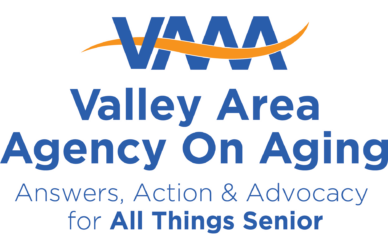One of our goals at Valley Area Agency on Aging is to keep seniors, caregivers, and providers aware of fraudulent scams against seniors and to prevent the waste of resources that provide seniors with healthcare services. If you have a suspicion, please learn more here about fraud, waste and abuse and how to report your suspicion. Refer to the outside agencies below for the most current scams. We’ve included some periodically reported scams and prevention resources from these agencies in the lists below.
Stop the Scam Before it Happens
✓ Make a list of contact information for family, close friends, health providers or anyone who may call regularly. This will help you know if the call is legitimate.
✓ Let a call go to voicemail if you do not recognize the phone number; Scammers rarely leave messages.
✓ Hang up if a stranger asks for personal or financial information. If you do answer the phone, it’s OK to hang up.
✓ Don’t share any personal information such as your social security number or credit card number to anyone over the telephone.
✓ Don’t assume a text or call is legitimate because the phone number comes from a familiar area code. Spammers use caller ID Spoofing to make it appear the text is from a trusted or local source.
✓ Don’t provide personal or financial information in response to an unsolicited text or at a website linked in the message.
✓ Don’t click on links in suspicious texts; they could install malware on your device or take you to a site that intends to do the same.
✓ Don’t reply, even if the message says you can “text STOP” to avoid more messages. This tells the scammer or spammer your number is active and can be sold to other bad actors.
✓ Don’t follow a text’s instructions to push a designated key to opt out of future messages.
✓ Don’t wire money. Wiring money is like sending cash. Once you send it, you usually can’t get it back. Don’t wire money even if someone sends you a check This is a scam. The person will tell you to deposit it, and wire some of the money back to them. Afterward, the bank will want you to repay the money you withdrew and sent to the scammer. That may also be a money mule scam that will involve you in moving stolen money.
✓ Don’t pay with a gift card. Disclosing the numbers on the back of the card allow the scammer control of the money on the gift card. No legitimate business or government agency will ask or insist that you pay with a gift card.
✓ Don’t pay with cryptocurrency. If someone requires you to pay for something with cryptocurrency, they’re probably a scammer. Payments made with this method do not come with legal protections. If you pay with cryptocurrency, you usually can’t get your money back unless the person you paid willingly sends it back, which is not likely.
Scam Alerts & Prevention Resources
Consumer Protection Alerts
See the latest and search for scams provided by Michigan's Attorney General's office.
Social Security Alerts
See the latest and search for Social Security scams. You can also report suspicions here.
FTC Consumer Alerts
Federal Trade Commission. Designed to protect consumers. View up to date scams.
Senior Medicare Patrol Alerts
Helps prevent Medicare fraud and protects beneficiaries. View their current alerts.

Identity
Identity theft can happen to anyone
These days information and money are regularly exchanges digitally. While convenient it has created a breeding ground of internet scams and hacks in addition to long time phone scams. Identity theft can happen to anyone at any age!
Here are some ways recommended by the to keep your money and personal information safe.
• Protect documents that have personal information. Keep things with personal information — think financial records or Social Security and Medicare cards — in a safe place. Shred them before you throw them away. If you get statements with personal information in the mail, take your mail out of the mailbox as soon as you can.
• Don’t share your Social Security number with someone who contacts YOU. While some organizations might need your Social Security number to identify you, they won’t call, email, or text you to ask for it. So if someone contacts you, asks you for your Social Security number, and says they’re from the IRS, your bank, or your employer — it’s a scam.
• Protect your information online and on your phone. If you’re logging in to an online account, use a strong password. Add multi-factor authentication for accounts that offer it. Multi-factor authentication makes it harder for scammers to log in to your accounts if they do get your username and password.
• Review your bills. Charges for things you didn’t buy, or an unexpected bill, could be a sign of identity theft.
How to tell if someone is using your identity
Despite best efforts to protect your information online, some hackers are very sophisticated and can still steal your identity. Here are ways to determine if you have had your identity stolen
What to do if you're experiencing identity theft
Get started here: identitytheft.gov
Did you get a text from your own number?
In one version of this scam, you’ll get a text thanking you for paying your bill with an offer to get a gift with a simple click of a link. Don’t click.
Clicking could expose you to scams, download malware, or get your phone number added to lists that are then sold to other scammers.
Want to filter unwanted text messages or stop them before they reach you? Here are some options:
On your phone Your phone may have an option to filter and block spam or messages from unknown senders.
Here’s how to filter and block messages on an iPhone and how to block a phone number on an Android phone. Through your wireless provider Your wireless provider may have a tool or service that lets you block calls and text messages. Check out ctia.org, a website from the wireless industry, to learn about options from different providers.
With a call-blocking app Some call-blocking apps also let you block unwanted text messages. Go to ctia.org for a list of call-blocking apps for Android, BlackBerry, Apple, and Windows phones.
You can also search for apps online. Check out the features, user ratings, and expert reviews.
Did you get an unwanted text message?
There are three ways to report it:
• Report it on the messaging app you use. Look for the option to report junk or spam. o How to report spam in the iPhone Messages app on How to report spam on an Android phone
• Copy the message and forward it to 7726 (SPAM).
• Report it to the Federal Trade Commission at ReportFraud.ftc.gov.
Family Distress
Attorney General: Avoid Being Scammed
Be suspicious when you receive a telephone call where:
• A child or grandchild calls you from a far away location.
• The grandchild says, “It’s me,” or “It’s your grandson,” or “It’s your favorite grandchild.”
• The child or grandchild is in some trouble or some type of distress.
• The caller asks for money to be wire transferred
If you receive such a call, you should verify the identity and location of the child or grandchild claiming to be in trouble. You should hang up and call another family member who can confirm your child or grandchild’s whereabouts. Try calling them at the telephone number through which you normally reach them. Stay calm and avoid acting out of a sense of urgency. Do not wire money unless you have verified with an independent third party that your child or grandchild is truly in trouble.
FTC Imposters
Known legal award collection scam involving someone posing as FTC to join case.
Government Impostrers
IRS Imposters
From Attorney General Office: The IRS is often the first to inform a victim that their identity has been stolen. Steps to ensure consumers protect themselves and avoid being a victim include:
• Do not give out your SSN unless there’s a good reason, you’re confident you’re giving it to someone authorized to request this information, and you know how they will protect it.
• File your tax return as early as you can.
• If you file electronically, use a secure internet connection.
• If filing by mail, send your tax return directly from the post office.
• Research a tax preparer thoroughly before you hand over your personal information and never send your personal information in a text or email.
• Review the IRS’ Taxpayer Guide to Identity Theft and its Identity Theft Information for Taxpayers.
• REMEMBER: The IRS will never call taxpayers with threats of lawsuits or arrests, nor will they ask you to wire money, pay with a gift card or prepaid debit card, or share your credit card information over the phone.
Social Security Imposters
From Inspector General:
Telephone scammers may send faked documents by email to convince victims to comply with their demands. The Social Security Administration Office of the Inspector General (OIG) has received reports of victims who received emails with attached letters and reports that appeared to be from Social Security or Social Security OIG.
The letters may use official letterhead and government “jargon” to convince victims they are legitimate; they may also contain misspellings and grammar mistakes.
This is the latest variation on Social Security phone scams, which continue to be widespread throughout the United States. Using robocalls or live callers, fraudsters pretend to be government employees and claim there is identity theft or another problem with one’s Social Security number, account, or benefits.
They may threaten arrest or other legal action, or may offer to increase benefits, protect assets, or resolve identity theft.
They often demand payment via retail gift card, cash, wire transfer, internet currency such as Bitcoin, or pre-paid debit card.
Inspector General Ennis urges continued vigilance against all types of phone scams no matter what “proof” callers may offer. As we continue to increase public awareness of phone scams, criminals will come up with new ways to convince people of their legitimacy.
Social Security will never:
threaten you with arrest or other legal action unless you immediately pay a fine or fee;
promise a benefit increase or other assistance in exchange for payment;
require payment by retail gift card, cash, wire transfer, internet currency, or prepaid debit card; or
send official letters or reports containing personally identifiable information via email.
If there is ever a problem with your Social Security number or record, in most cases Social Security will mail you a letter. If you do need to submit payments to Social Security, the agency will send a letter with instructions and payment options. You should never pay a government fee or fine using retail gift cards, cash, internet currency, wire transfers, or pre-paid debit cards. The scammers ask for payment this way because it is very difficult to trace and recover.

Romance
Romance Scams Are Common
Romance scams are a type of online fraud where imposters pretend to be in a romantic relationship with the victim in order to gain trust and then later extract money from their victims.
These scams typically begin on dating websites, social media, or messaging apps, where the imposter creates a fake profile and builds a relationship with their target.
Once trust is established, the scammer will eventually request money, often for a compelling reason, such as medical expenses, travel costs, or to help them with financial difficulties.
How to tell if I am Being Scammed
The relationship moves quickly, with the scammer expressing strong emotions early on.
There are always excuses for not meeting in person or video chatting.
How to Protect Yourself
Be cautious of anyone who seems too perfect or who expresses strong emotions early on.

EnvironmenT & Utility
Impersonation Tactics
Consumers Energy
It’s important to remember Consumers Energy and other utility companies will never:
• cold-call you and give an ultimatum that your service will be shut off shortly unless you act;
• visit your home to collect a bill or threaten shutoff;
• request immediate payment through a prepaid debit card, or any form of unusual payment;
• request personal or financial information such as a Social Security number; or
• claim a customer is entitled to a refund or rebate by asking for bank account or credit card information to make the alleged refund.
Overpaid Utility
Victims receive a robocall saying you paid too much on a utility bill. To make up for this mistake, they say, you’ll get a cash refund and a discount on your future bills. All you have to do is press a number to get your money and discount. Or, they may ask for your credit, debit, or banking information to refund.
Home Repair
Avoid clean-up and home repair scams. Especially after natural disasters. Unlicensed contractors and scammers may appear with promises of repairs, clean-up, and debris removal.
Some may demand upfront payment and not do the work, claim you’ll get a discount but quote outrageous prices, or lack needed skills.
Before anyone starts work:
Check them out. Ask for IDs, licenses, proof of insurance, and references.
See if local contact info is on their trucks.
Check with state and local consumer protection offices for complaints.
Get more than one estimate. Ask people you trust for recommendations.
Read the contract carefully. Make sure all promises are in writing and that you understand what you’re signing.
Never pay in cash. And never make the final payment until the work is done and you’re satisfied with it.

Tax & Finance
Car Insurance Refunds
Known scam regarding imposters taking advantage of refunds issued by insurance agencies.
Crypto Payments
Scammers pose as utility workers, government employees, romantic interests and more prompting victims to pay with cryptocurrency. It involves an impersonator, a QR code, and a trip to a store (directed by a scammer on the phone) to send your money to them through a cryptocurrency ATM.
Lottery and Sweepstakes
You get a call, email, or letter saying you won a sweepstakes, lottery, or prize — like an iPad, a new car, or something else. But you know it’s a scam because of what they do next: they ask you to pay money or give them your account information to get the prize. If you pay, you’ll lose your money and find out there is no prize. Read full article by FTC.
Year End Donations
Generally charities campaign for donations near the end of the year by contacting people via phone, mail, email, and social media. Imposters trick people into giving the donation to them, not the real charity. Here is an article from the FTC with relevant links to confirm you are donating to your desired charity.
Investement Scams

Medical
Avoiding Health Scams
From FTC:
• Search for the name of the treatment or product online, plus the words “review,” “complaint,” or “scam.”
• Ask a health professional first. Find out: o Does this product or treatment actually work? o What’s the scientific evidence? o How will it interact with other supplements or drugs the person you’re caring for takes?
• Be skeptical about products that come with guarantees or promises. Some companies want to take advantage of your hope.
• Know that “natural” doesn’t mean either safe or effective. In fact, “natural” can be both harmful and ineffective. And some “natural” products might interfere with proven treatments recommended by a doctor.
• Evaluate the claims. Ads must be truthful, not misleading. But remember, you are the best defense against health scams. Don’t assume that some government agency has approved a claim just because you see it in an ad.
• Know that the government wouldn’t hide proven remedies from you. If an ad offers a treatment that the seller claims the government or pharmaceutical industry doesn’t want you to know about, it’s a scam.
Health Insurance Scams
Health Department Scams
Known scams of imposters posing as health department employees regarding a health department funded grant that this resident qualified for. The scammer then went on to ask the resident for their bank information in order to apply for this grant. If you receive this call ask for the supposed employee’s name and badge number to confirm.
Skilled Nursing Scams
Home Health Care Scams
Genetic Testing Scams

TeChnology
Social Media Scams
Here are some things to do to protect yourself, no matter which social media platform you use:
• Try to limit who can see your posts and information on social media. Of course, all platforms collect information about you from your activities on social media, but visit your privacy settings to set some restrictions.
• Check if you can opt out of targeted advertising. Some platforms let you do that.
• If you see urgent messages from a “friend” asking for money, stop. It could be a hacker behind that post pretending to be your friend.
• Check out a company before you buy. Read Shopping Online for advice.
• Don’t deal with a vendor that requires payment by cryptocurrency, gift card, or wire transfer. That’s sure to be a scam.
Tech Support Scams
Google Voice
From FTC: Scammers target people who post things for sale on sites like Craigslist or Facebook Marketplace. They also prey on people who post looking for help finding their lost pet.
The scammers contact you and say they want to buy the item you’re selling — or that they found your pet. But before they commit to buying your item, or returning your pet, they feign hesitation. They might say they’ve heard about fake online listings and want to verify that you’re a real person. Or they might say they want to verify that you’re the pet’s true owner.
They send you a text message with a Google Voice verification code and ask you for that code. If you give them the verification code, they’ll try to use it to create a Google Voice number linked to your phone number. (Google Voice gives you a phone number that you can use to make calls or send text messages from a web browser or a mobile device.)
So, what’s the harm? The scammer might use that number to rip off other people and conceal their identity. Sometimes these scammers are after a Google Voice verification code and other information about you. If they get enough of your information, they could pretend to be you to access your accounts or open new accounts in your name.
Making Mobile Payments
From FTC:
Using mobile payment apps like CashApp, Venmo, or Zelle can be a convenient way to get quick cash to your family and friends. But remember the first rule of sending money, whether you’re using an app or money wiring service: Be sure you know who’s on the receiving end.
Otherwise, you might lose the money you sent — and then some. People have told the FTC they lost money to scammers using mobile payment apps. Some of these thieves pretend to be someone you know asking for money — say, for an emergency.
Others say they’re with the app company or your bank. Still other scammers with access to your contacts might trick you into thinking they’re someone you’ve given money to before.
Don’t be afraid to use mobile payment apps — just empower yourself against scammers who also use them.
Here are a few tips:
Never send money to anyone you don’t recognize. If you get a cash request from someone you do recognize, call or contact them using a number you know to be right. Confirm they made the request before you send money – even if you’ve sent them money through the app before.
When you use an app for the first time, it will usually ask permission to access information on your device – like your contacts – to make payments easier. If you’re not comfortable with that, deny access or uninstall the app.
Read your bank statements closely and regularly. Ask the app company and your bank to reverse any transactions you didn’t authorize.
Find out more about mobile payments and securing your mobile device. And, as always, if you’ve experienced a money transfer scam or other fraud, report it to the FTC.
Free Trials
From FTC:
Considering free offers? Keep this in mind:
• Do some research. Search the product and company name online with words like “review,” “complaint,” or “scam” to see what others are saying.
• Find the terms and conditions for the offer. If you can’t find them or can’t understand exactly what you’re agreeing to and when you’ll be charged — including what you’ll be charged for and the date by which you have to act to avoid a charge – don’t sign up.
• Monitor your credit and debit card statements. If you’re charged for something you didn’t order, dispute those charges as soon as you spot them.
• Read your credit and debit account statements. That way, you’ll know right away if you’re being charged for something you didn’t order. And if a company didn’t make it clear when they’ll bill you after your free trial, tell the FTC.
Package Delivery Texts
The Federal Trade Commission suggests three ways to report unwanted text messages:
• Report it on the messaging app. Look for the option to report junk or spam.
• If you are an AT&T, T-Mobile, Verizon or Sprint subscriber, copy the message and forward it to 7726 (SPAM), free of charge.
• Report it online to the Federal Trade Commission.
Information Disclaimer
The Compliance Officer will investigate all suspicions of fraud, waste or abuse and provide reports to the Compliance Committee. The information contained on this FWA webpage is for information purposes only. This information is provided by Valley Area on Aging and while we endeavor to keep this information up to date and correct, we make no representations of any kind, express or implied, about the completeness, accuracy, reliability, suitability or availability of shared information. Any reliance you place on such information is therefore strictly at your own risk.
